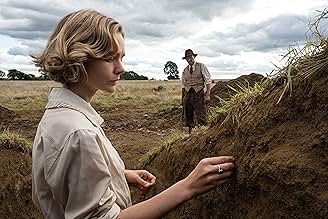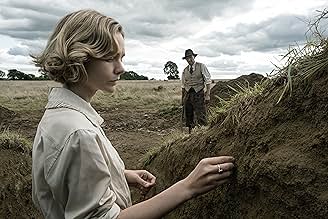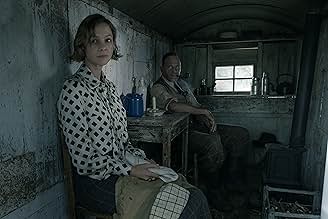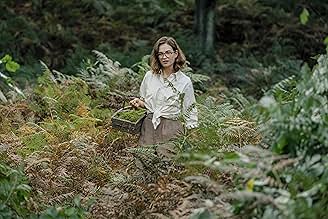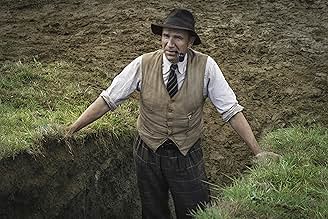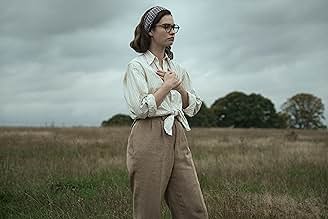Während der Zweite Weltkrieg auszubrechen droht, heuert eine vermögende Witwe einen Hobbyarchäologen an, um die Hügel auf ihrem Landsitz auszugraben.Während der Zweite Weltkrieg auszubrechen droht, heuert eine vermögende Witwe einen Hobbyarchäologen an, um die Hügel auf ihrem Landsitz auszugraben.Während der Zweite Weltkrieg auszubrechen droht, heuert eine vermögende Witwe einen Hobbyarchäologen an, um die Hügel auf ihrem Landsitz auszugraben.
- Regie
- Drehbuch
- Hauptbesetzung
- Nominiert für 5 BAFTA Awards
- 3 Gewinne & 11 Nominierungen insgesamt
Empfohlene Bewertungen
Honestly, I landed on the film last night, browsing titles on Netflix, because of Lily James - having known nothing else about the film from before (I usually skip trailers these days), but that she was in the cast was a huge draw for me - and found immense pleasure in this gem of a film. From Carey Mulligan and Ralph Fiennes to Ben Chaplin and Archie Barnes, the performances are all first-rate. The real-life story is told with great finesse, and filmed earnestly with a keen eye for production details. I have to say, even some of the lesser moments from the film shall stay with me for long, its appeal is that strong.
'The Dig' is a beautifully photographed period film (circa 1939, Suffolk, Great Britain) that seemed a lock to garner first Oscars for Ralph Fiennes (*overdue) and Cinematographer Mike Eley. Therefore, I'm instituting the 1st Annual "Oscar Snub Award" to the film most undeservedly left out of nominations. This year it was a no brainer - 'The Dig' wins and it wasn't close. So on with my original review B. S. ("Before Snub")...
Metaphors supporting Themes abound in 'The Dig' - "life is fleeting", "the search for meaning in our lives", "our relevance in History", and "is this all there is". Classic themes for dramas that are the eternal questions within our lives. The film intertwines those themes within the central characters, each conducting their own search for answers.
The framework of the story occurs on the eve of WWII for Great Britain. The impending gravity of such hovers over the film, intensifying the characters' emotions and urgency in searching for answers to such questions - the telescope and magnifying glass used within the story serve as metaphors to that end. Collapsing walls of the dig site that almost takes Basil Brown's life illustrate the tenuous fragility of life which could end in a moment of randomness. There are many more such examples in 'The Dig'.
Such poetic filmmaking takes painstaking attention to detail in production to pull off at the level achieved in this film. Utilizing the beautiful cinematography of Mike Eley and deft touch of Film Editor Jon Harris, Director Simon Stone succeeds in elevating the The Dig to an elite level of film art.
This is without question the Best Picture of the Year, and I am thankful this beautiful film came in at the last possible minute to save an otherwise (and understandable) blah year in the film industry.
Director Simon Stone's Oscar nomination for both Director and Best Picture is a virtual certainty.
Ralph Fiennes (Basil Brown) never misses (except taking home an Oscar), but I predict he will FINALLY* be recognized by Academy members en masse for his best of the year acting in this film, along with Mike Eley for Cinematography.
Carey Mulligan (Edith Pretty) should be nominated except she has two Oscar worthy films, both with a deserved good chance to take home an Oscar. Her spotlight lead part in 'A Promising Young Woman' has much more Oscar potential which will negate her role in The Dig - Mulligan should get Actress of the Year for putting forth two such great performances in one year!
At the end of the night (Oscar night), 'The Dig' could sweep up wins in the aforementioned major Oscar categories for 2020 - I certainly wouldn't bet against it happening (EDIT: Boy was I wrong 😑), and In terms of total Oscar nominations, this film sets up as the front contender for 2020. Then again, it could be a dodgy awards year - competition of last minute entries (is it going to get to the point where releases occur the day before the voting deadline?), and above-the-norm "agendas" abound in the industry these days [EDIT: Boy, was I correct about this (I am sorry to say)].
While the ensemble cast is highly competent, I don't see a particular supporting role having enough "spotlight momentum" to break-out and win an Oscar, although Lily James (Peggy Piggott) is a long-shot.
If there was one weak point in the film, it would be the digression to the character Peggy that seems to be thinly integrated into the film. This hole in the film likely comes from Editing decisions, and will probably cost Lily James, Jon Harris (Editing), and Stone and co-writer Moira Buffini (Adapted Screenplay) Oscar nominations.
The film runs under 2 hours, and it would have only required adding another 5-10 minutes to fully integrate Peggy into the story - Peggy is at a crossroads in her young life and her marriage to a man not interested in women forecasts a gloomy future - She gets sage advice from Edith Pretty (Mulligan) on seizing the day (and not to make the same mistakes she made).
My advice to Stone is "Don't start something without completing it". My guess is there is extra footage on Peggy and perhaps a Director's-Cut extended version will be released at some point completing Peggy's story - I'd like to see that.
👍👍 to all involved in 'The Dig' - the film is a treat for the eyes - the acting superior - production execution excellent - it is 2020's Best Picture by classic film making standards, despite being the biggest Oscar snub of the 2021 Academy Awards.
Here's hoping "agendas" and politics are left out of recognizing the best in film arts. (EDIT: Clearly agendas were NOT left out based on nominations MIA🙁)
* Ralph Fiennes sits atop my IMDb list of 'Best Actors Without An Oscar' (EDIT: and will continue to be atop the list for at least one more year - Note: At least Glen Close has a shot at graduating off my no-Oscar list 🤞)
Metaphors supporting Themes abound in 'The Dig' - "life is fleeting", "the search for meaning in our lives", "our relevance in History", and "is this all there is". Classic themes for dramas that are the eternal questions within our lives. The film intertwines those themes within the central characters, each conducting their own search for answers.
The framework of the story occurs on the eve of WWII for Great Britain. The impending gravity of such hovers over the film, intensifying the characters' emotions and urgency in searching for answers to such questions - the telescope and magnifying glass used within the story serve as metaphors to that end. Collapsing walls of the dig site that almost takes Basil Brown's life illustrate the tenuous fragility of life which could end in a moment of randomness. There are many more such examples in 'The Dig'.
Such poetic filmmaking takes painstaking attention to detail in production to pull off at the level achieved in this film. Utilizing the beautiful cinematography of Mike Eley and deft touch of Film Editor Jon Harris, Director Simon Stone succeeds in elevating the The Dig to an elite level of film art.
This is without question the Best Picture of the Year, and I am thankful this beautiful film came in at the last possible minute to save an otherwise (and understandable) blah year in the film industry.
Director Simon Stone's Oscar nomination for both Director and Best Picture is a virtual certainty.
Ralph Fiennes (Basil Brown) never misses (except taking home an Oscar), but I predict he will FINALLY* be recognized by Academy members en masse for his best of the year acting in this film, along with Mike Eley for Cinematography.
Carey Mulligan (Edith Pretty) should be nominated except she has two Oscar worthy films, both with a deserved good chance to take home an Oscar. Her spotlight lead part in 'A Promising Young Woman' has much more Oscar potential which will negate her role in The Dig - Mulligan should get Actress of the Year for putting forth two such great performances in one year!
At the end of the night (Oscar night), 'The Dig' could sweep up wins in the aforementioned major Oscar categories for 2020 - I certainly wouldn't bet against it happening (EDIT: Boy was I wrong 😑), and In terms of total Oscar nominations, this film sets up as the front contender for 2020. Then again, it could be a dodgy awards year - competition of last minute entries (is it going to get to the point where releases occur the day before the voting deadline?), and above-the-norm "agendas" abound in the industry these days [EDIT: Boy, was I correct about this (I am sorry to say)].
While the ensemble cast is highly competent, I don't see a particular supporting role having enough "spotlight momentum" to break-out and win an Oscar, although Lily James (Peggy Piggott) is a long-shot.
If there was one weak point in the film, it would be the digression to the character Peggy that seems to be thinly integrated into the film. This hole in the film likely comes from Editing decisions, and will probably cost Lily James, Jon Harris (Editing), and Stone and co-writer Moira Buffini (Adapted Screenplay) Oscar nominations.
The film runs under 2 hours, and it would have only required adding another 5-10 minutes to fully integrate Peggy into the story - Peggy is at a crossroads in her young life and her marriage to a man not interested in women forecasts a gloomy future - She gets sage advice from Edith Pretty (Mulligan) on seizing the day (and not to make the same mistakes she made).
My advice to Stone is "Don't start something without completing it". My guess is there is extra footage on Peggy and perhaps a Director's-Cut extended version will be released at some point completing Peggy's story - I'd like to see that.
👍👍 to all involved in 'The Dig' - the film is a treat for the eyes - the acting superior - production execution excellent - it is 2020's Best Picture by classic film making standards, despite being the biggest Oscar snub of the 2021 Academy Awards.
Here's hoping "agendas" and politics are left out of recognizing the best in film arts. (EDIT: Clearly agendas were NOT left out based on nominations MIA🙁)
* Ralph Fiennes sits atop my IMDb list of 'Best Actors Without An Oscar' (EDIT: and will continue to be atop the list for at least one more year - Note: At least Glen Close has a shot at graduating off my no-Oscar list 🤞)
"The Dig" (2021 release from the UK; 112 min.) reminds us at the very beginning that this is "Based On a True Story". We then go to "Suffolk, England, 1939" as Basil Brown arrives at the house of Edith Pretty. Turns out Mrs. Pretty has hired Mr. Brown to do some archeological work on her estate. Her young son excitedly asks Mr. Brown "Are you going to dig upo the mountain?". Mr. Brown, taking room and pension at Mrs. Ptretty's house, starts to dig and soon is working his way towards some intriguing finds... At this point we are 15 min. into the movie, but to tell you more of the plot would spoil your viewing experience, you'll just have to see for yourself how it all plays out.
Couple of comments: this is directed by little known Australian director Simon Stone ("The Daughter)". Here he brings us a historical drama about what later became known as the Sutton Hoo treasure, one of the biggest archeological finds in British history. The setting of 1939 is pivotal in several ways: of course the threat of WWII is in the air, but even more important, the way of life in those days was just entirely different, and being in a remote English area (near Ipswich) only reinfornces that. So be prepated for a slow moving film, I didn't mind it one bit. Even more critical for the movie is Carey Mulligan's exquisite lead performance. Playing a person who is more than 20 years her senior in real life (Carey is 35, Mrs, Pretty was in her mid-50s in 1939), she does so with grace and style and presence. The role couldn't be more different from what Carey did in the recently released "Promising Young Woman", which was in my top 3 of the bests films of 2020. Ralph Fiennes is equally great as the excavator Mr. Brown. Last but not least there is a wonderful orchestral score by Stefan Gregory, who I must admit was previously unknown to me.
"The Dig" opened last weekend in select theaters for a short run before then moving on to Netflix. (Seems like every other new theatrical release these days follows that pattern....) Thankfully the film opened at my art-house theater here in Cincinnati. The early Satruday evening screening where I saw this at was attended so-so (exactly 5 people including myself). Never mind. If you are in the mood for a good ol' fashioned hisstorical drama featuring outstanding performances from Carey Mulligan and Ralph Fiennes, I'd readily suggest you check this out, be it in the theater (if you still can), on VOD< or eventually on DVD/Blu-ray, and draw your own conclusion.
Couple of comments: this is directed by little known Australian director Simon Stone ("The Daughter)". Here he brings us a historical drama about what later became known as the Sutton Hoo treasure, one of the biggest archeological finds in British history. The setting of 1939 is pivotal in several ways: of course the threat of WWII is in the air, but even more important, the way of life in those days was just entirely different, and being in a remote English area (near Ipswich) only reinfornces that. So be prepated for a slow moving film, I didn't mind it one bit. Even more critical for the movie is Carey Mulligan's exquisite lead performance. Playing a person who is more than 20 years her senior in real life (Carey is 35, Mrs, Pretty was in her mid-50s in 1939), she does so with grace and style and presence. The role couldn't be more different from what Carey did in the recently released "Promising Young Woman", which was in my top 3 of the bests films of 2020. Ralph Fiennes is equally great as the excavator Mr. Brown. Last but not least there is a wonderful orchestral score by Stefan Gregory, who I must admit was previously unknown to me.
"The Dig" opened last weekend in select theaters for a short run before then moving on to Netflix. (Seems like every other new theatrical release these days follows that pattern....) Thankfully the film opened at my art-house theater here in Cincinnati. The early Satruday evening screening where I saw this at was attended so-so (exactly 5 people including myself). Never mind. If you are in the mood for a good ol' fashioned hisstorical drama featuring outstanding performances from Carey Mulligan and Ralph Fiennes, I'd readily suggest you check this out, be it in the theater (if you still can), on VOD< or eventually on DVD/Blu-ray, and draw your own conclusion.
So rare to watch a wonderfully gentle but poignant film. It tugs at the emotions as it tells a largely true. Some liberties are taken with the truth but largely accurate. The real story of Peggy Piggott is fascinating and worth a film in itself. However the real stars of the story are Edith Pretty and Basil Brown portrayed brilliantly by Mulligan and Fiennes. One small criticism is that Carey Mulligan is too young for the part but she carries it off superbly and the performance by Ralph Fiennes is one of the best I have seen in a long time. The whole cast is superb and the backdrop of imminent war is ever present throughout the film. I have visited Sutton Hoo a number of times and studied the excavation and I still marvel at the work Basil Brown did. As an archaeologist myself I can say his work even by today's standards was of the highest order. Many of the academic archaeologists before and after WW2 were useless when it came to excavation and recording it. Basil Brown did everything right and it is fantastic he is at last getting the credit he deserved and that Edith Pretty wanted for him. It is to the great shame of the academic establishment it has taken so long. The film portrays this extremely well.
An intriguing little piece of British history, The Dig tells a slow-burning story with understated and genuine drama throughout, turning what could have been a rather dry tale of archaeology into a genuinely gripping character drama. Its historical context takes a little while to become fully relevant, but ultimately, The Dig really proves itself as a captivating watch.
One of the things that I really liked about The Dig was its patience. Never dragging yet never rushing, the film takes its time to build up all of its main strengths, from its characters, their emotional back stories, and the overarching historical context of the outbreak of World War II.
Complete with elegant camerawork, a beautiful score and impressively atmospheric direction that makes it an eye-catching watch from the first few moments, The Dig has enough confidence and depth to keep you engrossed even if its story isn't advancing apace, something that's a lot harder to pull off than you may think.
One of the big reasons that the film's patient pacing and style work so well is because of its understated, genuine drama. With calm yet fully convincing performances across the board, particularly from Ralph Fiennes and Carey Mulligan, this isn't a showy period drama by any means, but eases you into a story about real people, making them the centre of attention far more than the historical significance of the event.
I'm not particularly well-versed in archaeology, and I didn't know about this discovery before watching this film. I think that might be the case for many other people, but the great thing about The Dig is that it's primarily a character-driven drama, and one that uses emotional intrigue to bring you closer to the story at hand and allow you to appreciate its importance.
One element where the film does seem to falter is in its use of the historical backdrop of the lead-up to World War II. Set in the summer months of 1939 before the outbreak of war, there are sporadic references to the coming conflict through the first two acts of the movie, but they don't seem to bear much relevance to this story about an archaeological find.
However, the film slowly begins to unveil how the historical context plays into its characters' personal lives and the fate of the dig itself, with dramatic focus shifting significantly in the final act, but just at the right point that the sudden arrival of the war into everyday life feels just like what it would have been like to experience it first-hand, taking over everything seemingly normal in an instant.
As a result, while the historical backdrop seems almost contrived at first, it really comes good as the film progresses, another demonstration of how the patience of The Dig really plays into its hands throughout.
One of the things that I really liked about The Dig was its patience. Never dragging yet never rushing, the film takes its time to build up all of its main strengths, from its characters, their emotional back stories, and the overarching historical context of the outbreak of World War II.
Complete with elegant camerawork, a beautiful score and impressively atmospheric direction that makes it an eye-catching watch from the first few moments, The Dig has enough confidence and depth to keep you engrossed even if its story isn't advancing apace, something that's a lot harder to pull off than you may think.
One of the big reasons that the film's patient pacing and style work so well is because of its understated, genuine drama. With calm yet fully convincing performances across the board, particularly from Ralph Fiennes and Carey Mulligan, this isn't a showy period drama by any means, but eases you into a story about real people, making them the centre of attention far more than the historical significance of the event.
I'm not particularly well-versed in archaeology, and I didn't know about this discovery before watching this film. I think that might be the case for many other people, but the great thing about The Dig is that it's primarily a character-driven drama, and one that uses emotional intrigue to bring you closer to the story at hand and allow you to appreciate its importance.
One element where the film does seem to falter is in its use of the historical backdrop of the lead-up to World War II. Set in the summer months of 1939 before the outbreak of war, there are sporadic references to the coming conflict through the first two acts of the movie, but they don't seem to bear much relevance to this story about an archaeological find.
However, the film slowly begins to unveil how the historical context plays into its characters' personal lives and the fate of the dig itself, with dramatic focus shifting significantly in the final act, but just at the right point that the sudden arrival of the war into everyday life feels just like what it would have been like to experience it first-hand, taking over everything seemingly normal in an instant.
As a result, while the historical backdrop seems almost contrived at first, it really comes good as the film progresses, another demonstration of how the patience of The Dig really plays into its hands throughout.
Wusstest du schon
- WissenswertesReimagines the events of the 1939 excavation of Sutton Hoo near Woodbridge, in Suffolk, England. It is the site of two early medieval cemeteries that date from the 6th to 7th centuries. One cemetery had an undisturbed ship burial with a wealth of Anglo-Saxon artifacts. Most of these objects are now held by the British Museum.
- PatzerEdith's son Robert can be seen wearing an aluminium foil hat early in the movie, Aluminium foil did not surface until after the war, but tin foil had existed since the 19th century.
- Zitate
Basil Brown: Robert, we all fail. Every day. There are some things we just can't succeed at no matter how hard we try. I know it's not what you want to hear.
- VerbindungenFeatured in Jeremy Vine: Folge #4.25 (2021)
- SoundtracksLa Rejouissance (Allegro)
Written by George Frideric Handel
Public Domain
Arranged by Julian Kershaw
Performed by Alder Valley Brass
Top-Auswahl
Melde dich zum Bewerten an und greife auf die Watchlist für personalisierte Empfehlungen zu.
- How long is The Dig?Powered by Alexa
Details
- Erscheinungsdatum
- Herkunftsländer
- Offizieller Standort
- Sprache
- Auch bekannt als
- La excavación
- Drehorte
- Produktionsfirmen
- Weitere beteiligte Unternehmen bei IMDbPro anzeigen
Box Office
- Weltweiter Bruttoertrag
- 693 $
- Laufzeit1 Stunde 52 Minuten
- Farbe
- Sound-Mix
- Seitenverhältnis
- 2.00 : 1
Zu dieser Seite beitragen
Bearbeitung vorschlagen oder fehlenden Inhalt hinzufügen







